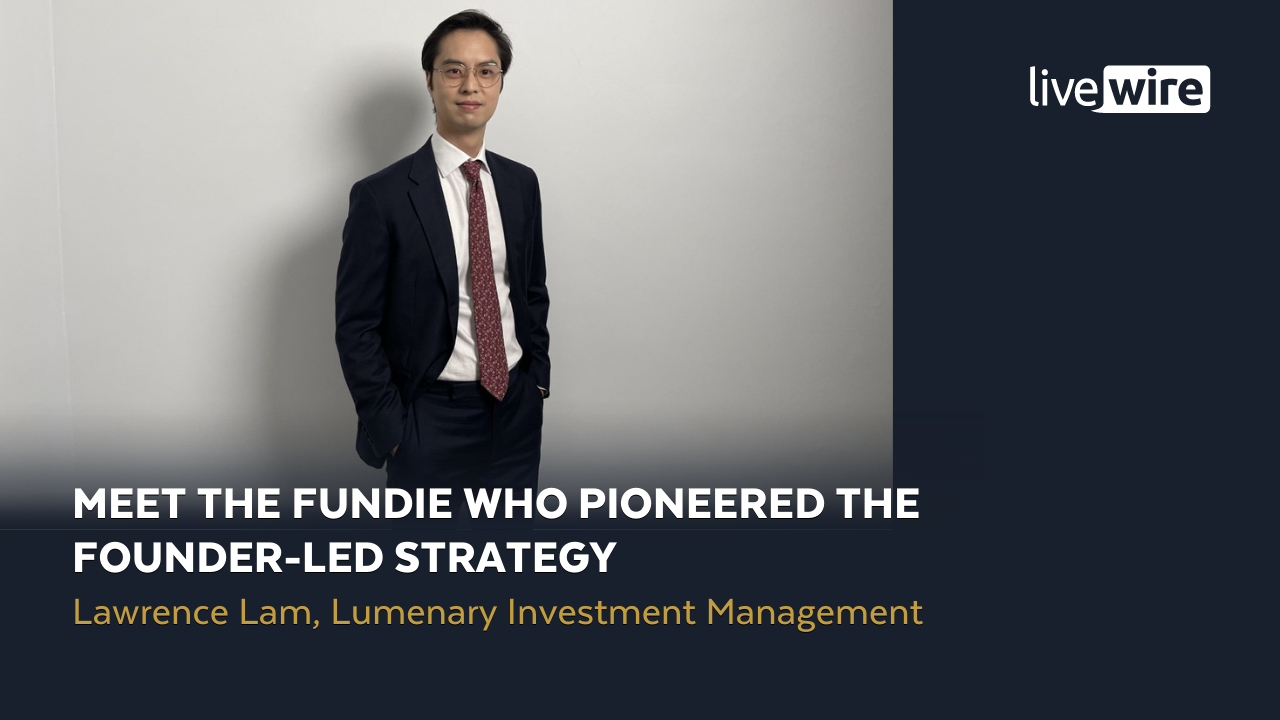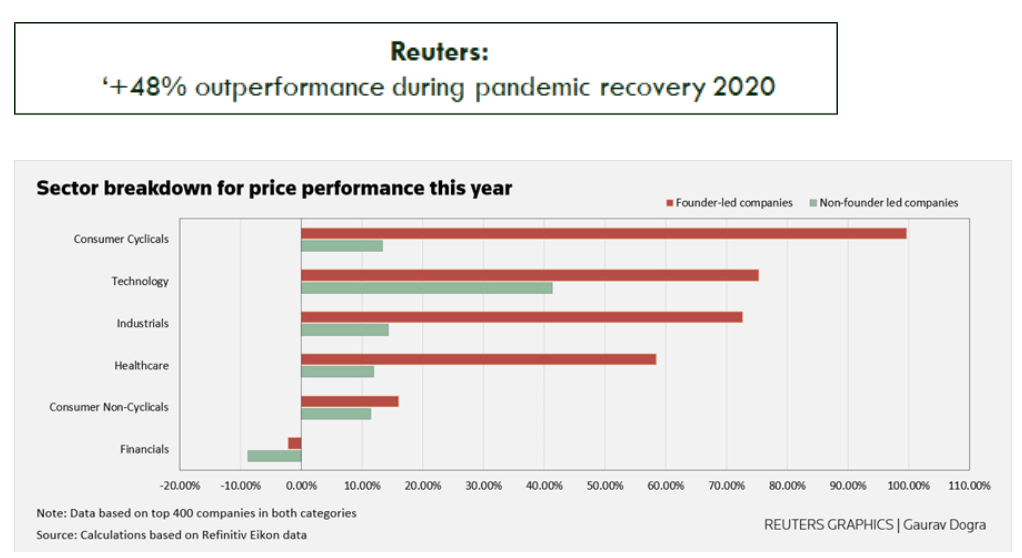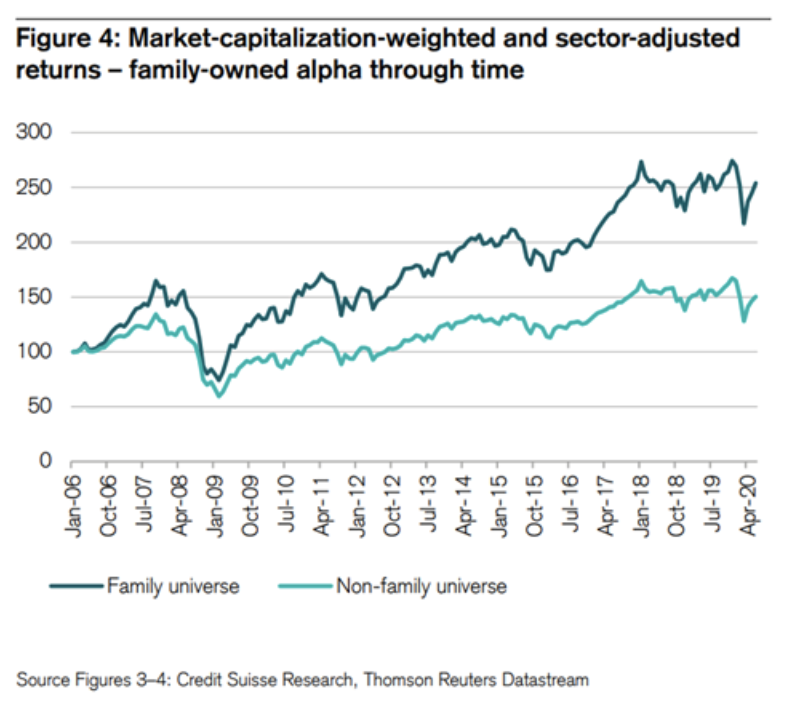Meet the fundie who pioneered the founder-led strategy
Founders are fascinating creatures - the ability to turn an idea into a billion-dollar empire captures the imagination of us all. Their relentless pursuit of success drives proven results and they are typically at the cutting edge of innovation. Zuckerberg, Bezos, Jobs and Gates are all names that will go down in history for the dynasties they built, yet new inspiring founders are always on the horizon.
A crucial part of any investment strategy is understanding the management teams at the helm and ensuring their incentives are aligned with shareholders. This is where the founder-led strategy comes into play.
At its core, the founder-led strategy looks to harness the hunger of founders. Combine this hunger with an alignment of interests and it becomes a powerful combination. This strategy maximises the alignment between investors, management and board.
And there is evidence to suggests this works, with Credit Suisse research revealing that founder-led companies have generated an annual average alpha of around 3.7% since 2006.
Lawrence Lam embraces this approach. He is Managing Director & Founder of Lumenary Investment Management, who run a global equities strategy focused exclusively on founder-led companies, and a longtime Livewire contributor.
Growing up, he saw his father start a mortgage broking practice, taking it from a one-man operation to become over the course of twenty years an award-winning network of brokers.
In the pursuit of bottling this founder’s spirit and harnessing its investment benefits, he launched Lumenary Investment Management in 2017 after a career in investment banking, consulting and government.
In this Fund Manager Q&A, we explore Lawrence's strategy, discuss what makes a founder-led company successful and identify what to look out for when considering an investment opportunity.
.png)
How would you describe your investment style?
The fund invests in founders who own and run their companies, consisting of 10-20 founder-led companies, with an emphasis on emerging products and services. The fund takes a defensive slant by dynamically reallocating across diversified sectors, geographies and vintages to maintain a balanced spread of exposures.
Since 2017, the fund has generated returns of 16% p.a (net of ongoing fees).
Why are founder-led companies so desirable?
Chefs who eat what they cook
At its core, the founder-led strategy looks to harness the hunger of founders. Combine this hunger with an alignment of interests and it becomes a powerful combination. This strategy maximises the alignment between investors, management and board.
Great investors think of themselves as owning a slice of a company. They have the mentality of a business owner, rather than someone who has just clicked ‘buy’ on their trading platform. Even though most investors can think like owners, they still ultimately don’t have managerial influence over a company: they can’t guarantee decisions are being made in their long-term interests.
So there exists a gap in alignment between those that own the company and those who manage it.
Shareholders will try to close the gap by offering management options and bonuses. These work to an extent, but present their own set of problems. As an ex-investment banker, I saw how managers shift goal posts and manipulate bonus schemes. This is a question of motivation that cannot be solved by money alone. It’s a behavioural problem involving incentives, intent, and motivation.
Frankly it’s a problem investors don’t need to solve. It’s a problem investors can avoid altogether. Instead of trying to fit a square peg in a round hole, the solution is to look for managers who already have ownership in their businesses. Think of them as active owners. These are often the founders or founding families.
Through every market cycle, even the pandemic, these founder-led companies have demonstrated outperformance:

Pilots without parachutes
I prefer sitting in planes with pilots who don’t have their own parachute. The same goes for investing. Picking the right pilot is like picking the right steward for your capital.
There are some clues to finding great pilots:
- Exclusive share float: Limited seats on the plane. Founders know equity is the most valuable thing in business. They don’t give it up lightly, sometimes holding onto it through generations (as seen with Hermes for example).
- Lower executive turnover, smaller boards: Captains who have operated the plane for a long time. This cuts the red tape and bureaucracy in decision making. Apple famously has a no-committee policy.
- Balance sheet strength: These pilots are planning for the entire long haul flight, not just the next stopover. They keep the plane prudently fuelled and focused on the future.
- Unafraid to challenge herd mentality and take calculated risks: They take calculated risks to navigate turbulence. They don’t simply follow what others do. Look for bold founders unafraid to take a different view of the status quo - it’s not about their career, it’s about doing what’s right for the company.
- Future-proofing, not just bandaging: Founders think long term. They’ll actively invest in R&D and CAPEX even if it hurts profit over the short term. They won’t just replace parts in the plane, but they’re willing to upgrade the plane altogether.

Founder led companies have outperformed by 3.7% between 2006-2020 (Source: Credit Suisse)
What are some notable examples of founder-led companies?
The advantage of this investment style is being able to access the potential of very driven founders. I like to harness this hunger early in a founder’s lifecycle and maximise the runway. Readers will already know of the Walmarts, Alphabets, Amazons, Facebooks and Afterpays of the world - they’ve already been covered and are easily accessible by mainstream investors.
With my strategy, I prefer to look elsewhere and focus on hidden compounders whose shares are less accessible and the founders who still haven’t ‘made it.' This allows me to leverage the founder-led strategy to its full potential.
Publicly I’ve disclosed our fund holds Adyen (AMS: ADYEN) and Kakao (KRX: 035720) who I think are stand-out next-generation founder-led companies you will hear about for decades to come. They’re also driven by some very astute founders. The reason why I like European and Asian founders is their longevity; they’re more focused on building long-term dynastic companies.
It also allows me to diversify away from US founders who tend to flip their companies. The founders of Adyen and Kakao have been there from the very beginning, and they have an ideal balance between longevity and runway. Adyen is 15 years old and Kakao is 11. Another point, of course, is that European and Asian founder-led companies are typically much less hyped than their American counterparts.
I also like the founder’s philosophy that Mike Cannon-Brookes and Scott Farquar adopt with how they run Atlassian (NASDAQ:TEAM). They’ve elected to pay themselves a salary of $77k - the minimum wage. You’ll often see this with true founders (Buffett included). Atlassian’s approach to reinvestment shows they’re not resting on their laurels, they’re still hungry and want to entrench themselves further in their customers’ ecosystems. They will continue to compound for many more years.
Then you have the game-changers like Marcos Galperin who transformed the entire continent of South America with what he did at MercadoLibre (NASDAQ: MELI).
He launched MercadoLibre in 1999 as the ‘eBay of South America’ in a non-existent market. South Americans had low internet penetration rates and no interest in online shopping. The initial years were like drilling into clay; it was years before they reached the soil. It wasn’t just persistence alone, but the willingness to reinvest and evolve the business.
They went from a P2P model like eBay, to a broader shopping platform similar to Alibaba’s. What’s more interesting though is how they fended off competition from eBay, Amazon, and a local rival called DeRemate in the early 2000’s.
Lawrence Lam's key takeaways for readers interested in founder-led investing:
- Galperin chose to develop MercadoLibre’s own IT infrastructure rather than buying off-the-shelf software - greater expense upfront, but much greater control and ongoing freedom. Short-term pain for long-term gain.
- Galperin made a calculated bet in 2003 to develop MercadoLibre’s own payments platform. It was only 4 years in; fintech wasn’t even a word yet - but that wasn’t a deterrent. Looking back now, this was a classic founder’s move: prescient and bold, but one which continues to reap benefits even 20 years on.
I have a lot of admiration for what Galperin has achieved as a founder. Though for my fund, MercadoLibre isn’t something I would look at anymore; it’s a company that suits the institutional investors now. The founder’s runway has changed - Galperin stepped back in 2020 and that spirit is not the same as it was in the early 2000s. I’m looking to find the next MercadoLibre.
Locally, I’ve always admired ARB (ASX:ARB) and how Andrew and Roger Brown have grown a seemingly simple local business into a global adventure brand. The fact that it all started from a dissatisfaction with low-quality bull bars that prompted them to weld their own in a family garage is an amazing story.
But then taking that one local shop and growing it into a global franchise - that’s incredible. ARB wouldn’t be the global company today without its founders.
To invert that thought - there’s no way a salaried CEO would have made those long-term strategic investments in the early days. They would have played it conservatively, protecting short-term profits at the expense of longer-term compounding opportunities.
If you give two people the same business to run, one with equity ownership and the other on salary, you’ll get two very different outcomes.
One will be playing a test match, the other will be playing T20.
Which sectors are founder-led companies most common?
Historical context
A generation ago, it took longer for founders to grow a company into a global powerhouse; to do so required significant capital expenditure and very few founders were able to hold onto their equity as they grew. A handful of exceptional founders managed to do it - think about Europe’s largest fashion houses, America’s old guard stalwarts such as Walmart, Nike, Marriott. In Australia, we've had Westfield, Aristocrat and Visy.
These exceptional founder-led companies achieved the near-impossible; it took them decades to build and the degree of difficulty was very high.
The development of advanced tools makes this era unique
Fast forward to today, in this investment era, it’s a different ball game. The playing field has changed - it is now possible to achieve huge growth in a very short time span.
Tools that didn’t previously exist are now available for founders to leverage. Instead of having to hire large marketing teams, they can now reach customers efficiently through social media and digital advertising platforms. Instead of having to open bricks-and-mortar shopfronts, they can spin up online shopfronts and accept payments from customers all over the world. Companies can reach global audiences and founders possess even greater potential in this era with the ability to go viral so quickly.
With this evolving landscape in mind, the opportunity for investors is therefore in capital-light businesses. This is where founders can truly excel and can change the game. Companies like Zillow, Hellofresh, Spotify, DocCheck have shown they can fundamentally change an entire industry. It has been made possible because founders are utilising a new generation of tools to reach customers efficiently without the need for heavy expenditure on human resources or hard assets. It also means their operational leverage is incredible.
If I look at the trend, the timeframe to grow multi-billion dollar companies will continue to shorten. Credit Suisse research showed a founder’s children (the second generation) drove most of the growth. But expect this to change in future: First-generation founders will be the engine of growth going forward.
How to find these founders
The right question isn’t which sectors founder-led companies are most common, but rather how to identify quality founder-led companies within each sector. The answer is to look for capital-light businesses. Take today’s fastest-growing companies for instance. Many of them offer a technology product. That’s the obvious industry when it comes to capital-light businesses. But there’s more to the world than just tech.
It would be prudent to diversify beyond tech, especially given many lesser-known industries present equally compelling opportunities for investors. For a well-rounded founder-led portfolio, investors should evaluate companies based on capital efficiency.
Astute founders like to run lean operations for the reasons I outlined above. They prefer to spend less on capital intensive hard assets but instead allocate resources to hyper-scalable moats such as sales funnels and brand reputation.
There’s more to founders than just technology
I’ll illustrate this with an example. Take for instance the drinks market, this is traditionally a very capital-intensive industry. Manufacturing and bottling require large factory capacity and high CAPEX. The traditional way to build such a business would be to seek external capital and build a factory before working on the sales and distribution network. This is valid, but not one a hungry and resourceful founder would take.
They would keep the company capital-light. They would outsource the bottling and manufacturing and instead redirect expenditure towards building global distribution networks, digital sales channels and marketing for the brand. They would focus on building these hyper-scalable assets and avoid committing to capital-intensive infrastructure. Even for a boring industry such as drinks, investors can identify these capital-light founder-led companies and ride alongside these founders.
There are a plethora of founders disrupting traditional industries with capital-light strategies. All this is made possible with the tools available today that weren’t available a generation ago.
Are there any risks for investors that are magnified within founder-led companies?
Not magnified, but certainly different. Founder-led investing presents a unique set of risks that investors need to be cognisant of. The strategy is built upon the thesis of hunger and alignment, so there is a need to monitor these behaviours to ensure they remain true into the future.
Direction of founder ownership matters more than absolute level
The absolute holding percentage is relevant, but more importantly the key is to observe the direction of the founder’s shareholdings. With what velocity is the founder selling or acquiring shares? Founders will offer a plethora of logical reasons they may be selling, but investors need to remember - actions speak louder than words. Founders that offload a large portion of their holdings presents a clear red flag.
Companies will issue a ‘statement of changes in beneficial ownership of securities’ - this is known as Form 4 in the US, or similarly ‘change in substantial holding’ in Australia. Investors need to stay on top of these updates.
If you sense there is a significant change in founder motivation, then look elsewhere. Globally there are plenty of motivated founders (over 1,000 founder-led companies in the world). There’s no need to be wedded to any one founder, especially if motivations change.
Interestingly, founders may not sell at the optimal time. Founders of Afterpay, for example, left plenty of cash on the table having sold down in 2020. Even though they’ve lost out in the short-term, it remains a red flag over the long-term - the fact is, the strength of alignment with investors has been weakened.
Another example is Facebook - since 2020, Mark Zuckerberg has sold a significant amount of Facebook shares. The lesson for investors is to watch the velocity of ownership changes closely. It matters over the long term.
Motivation to continue pushing boundaries
The advantage of founders is they don’t accept the status quo. Their success is driven by questioning long-held traditions and pushing new frontiers, which is why they present such compelling investment opportunities. The risk is some founders can become complacent and lose their hunger over time, choosing instead to ride off into the sunset by setting their companies to cruise control. There are several telltale signs:
- High base salaries and low expenditure on R&D and CAPEX
- Increasing extracurricular activities - typical examples are overly extravagant property or car purchases, or increasing business interests outside of the company
- Over self-promotion and marketing - the focus becomes about them, not the company
Due diligence on intercompany transactions
Investors need to monitor and watch related party transactions and ensure they make financial sense. In the past, plenty of founders have used outside entities to extract value to the detriment of shareholders. Investors can do their due diligence as annual reports will outline related party transactions. For example, many investors could have sidestepped the WeWork fiasco if they had done their due diligence on the disclosed related party transactions.
Succession planning
This is a very real risk for older founders. Their influence has led to their success, but at a certain age, they will need to develop a transition plan.
I met with a Korean founder-led company in Seoul and through conversations with the management team, discovered the founder’s daughter was more interested in becoming a K-pop star than succeeding her father.
Investors need to understand it is possible, but rare for sons and daughters to emulate the same success as their parents. The key is to see founders maintain their influence and establish a company culture that permeates beyond their time as manager. This is possible. Apple is a testament to how Steve Jobs succession plan emphasised company culture; even resonating beyond his lifetime.
Investors who don’t have access to management will need to rely on desktop research, but another way to mitigate this risk is to invest in younger, hungrier founders with a longer runway for success.
Mitigating portfolio risks
The risks I’ve mentioned relate to individual companies but for investors looking to build a portfolio of founder-led companies, there are other portfolio construction risks that need to be considered. I’ve written about how to mitigate these portfolio risks in this article.

What particular founder-led company Lam is attracted to at the moment?
I don’t mention any names when our fund hasn’t fully invested yet, but readers may be interested in which sector or geography I’m targeting.
I’m currently in the middle of deployment into a Chinese founder-led company. It’s an education technology company listed on the China A-shares market.
This opportunity is attractive because the domestic market in China has an 80% retail investor base who react emotionally. This opens up opportunities for funds like us.
The company is unaffected by the education reforms, yet has seen a panic sell-off given the K-12 policies China has implemented. Fundamentals continue to grow as they are the market leader, but the share price has dropped over 50%. This is an opportunity where I’ll look to capitalise over the next 1-2 years and recycle our capital into another opportunity once prices normalise.
My preference is always to invest directly in Chinese-listed companies (A-shares), rather than investing in US-listed or Hong Kong-listed Chinese companies. I think we have an edge against retail investors in China and the A-shares are much less hyped than the foreign-listed Chinese companies.
Conclusion
Are you sold on the founder-led strategy? Regardless, the importance of understanding what drives management and how they go about creating value for their firm is paramount - and who better to execute this than founders. The importance of being adaptable and relentless are synonymous with the entrepreneurial traits of these leaders - as long as this can be sustained for the long run.
As technology develops further and capital becomes more effective, it appears the quantity and calibre of these companies are on an upward trajectory.
Interested in learning more? I recently published a collection where we explored the rise of founder-led companies, potential risks investors should be aware of and the fundie tips for the next behemoths.
Enjoyed this content?
Make sure you "FOLLOW" my profile to be notified of the upcoming entries in this series. Also ensure to follow Lawrence Lam for his latest updates.
If you enjoyed this wire, please click like and comment below the founder-led companies you have on your watchlists.
Why you can’t miss the Livewire Income Series
Livewire’s 2021 Income Series gives investors best in class education and premium content to build a bulletproof income portfolio.
Click here to view the dedicated website, which includes:
- A list of income-focused ETFs, LICs and funds.
- Detailed fund profile pages, with data powered by Morningstar.
- Exclusive interviews with leading fund managers.
- Videos and articles to help you perfect your income strategy.
5 topics
1 stock mentioned
1 contributor mentioned


